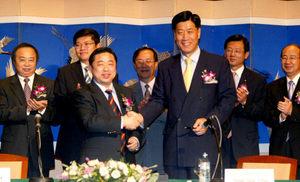 |
Industries fear technological secrets on the move
The high-tech field has raised concerns that advanced Korean technology may be leaked to China through firms from that country taking over Korean companies. Critics charge that Chinese firms obtain cutting-edge technology at cut-rate costs while at the same time failing to invest in other aspects of the companies. Korean management at BOE Hydis requested court protection in an August 8 petition to Seoul Central District Court, saying that there was a shortage of capital at the company. BOE Hydis said its situation was in part due to parent company BOE Group failing to invest in the firm. BOE Group is a China-based firm that took over the Korean firm Hydis in 2003. Chung Nam-il, a leader of the labor union at BOE Hydis, said that BOE Group "has not invested [in Hydis] at all since 2003 when it took over the company. BOE only has an mind to drain away state-of-the-art core technologies at an unreasonably low price." The BOE Group lent Hydis’ Advanced Fringe Field Switching (AFFS) technology to BOE’s Chinese affiliates in 2004. This year, the group’s Chinese affiliates tried to grab experts in the technology and bring them to China. This move was strongly resisted by creditor banks and the Korea-based company’s labor union. In addition, in 2004 BOE Group paid BOE Hydis 75 billion won (US$78 million) for using the technologies for 20 years, fueling controversy that the company had in effect been sold at a bargain rate.The management at BOE Hydis, appointed by BOE Group, in turn used the money to construct a 5th generation LCD factory in Beijing. A BOE affiliate that has begun construction of a 6th generation factory in Shenjin, China, is reportedly going to use Hydis’ core technologies. An official of Hydis said, "The BOE side has never shown a will to invest in South Korea." In January 2003, when BOE Group took over Hydis, the group directly invested only W150 billion out of the W400 billion cost of the takeover. The additional W250 billion was obtained from creditor banks. The story of Shanghai Auto’s acquisition of Korea’s Ssangyong Motor is a similar story. Following the acquisition, Shanghai Auto has so far only fueled debate that technology is being leaked to China. It has not kept its promises regarding levels of investment and employment. A Ssangyong Auto official said, "Shanghai Auto suggested less than W30 billion won for using core technologies and the right to product auto parts. Considering the fact that it takes W200-300 billion to develop a car, that is an excessively low price." Possibility is high that Daewoo Electronics, a third-largest home appliance maker in the nation, may see a similar controversy. Videocon, an Indian firm, was recently chosen as a preferred bidder for Daewoo Electronics. Critics fear that Videocon has more interest in Daewoo Electronics’ core technologies and overseas marketing network than in investing in the domestic market. Observers doubt that Videocon would choose to directly invest in South Korea’s appliance market, where Samsung Electronics and LG Electronics dominate. China and India have emerged as giants in the worldwide merger and acquisition (M&A) market based on their enormous foreign exchange reserve.





